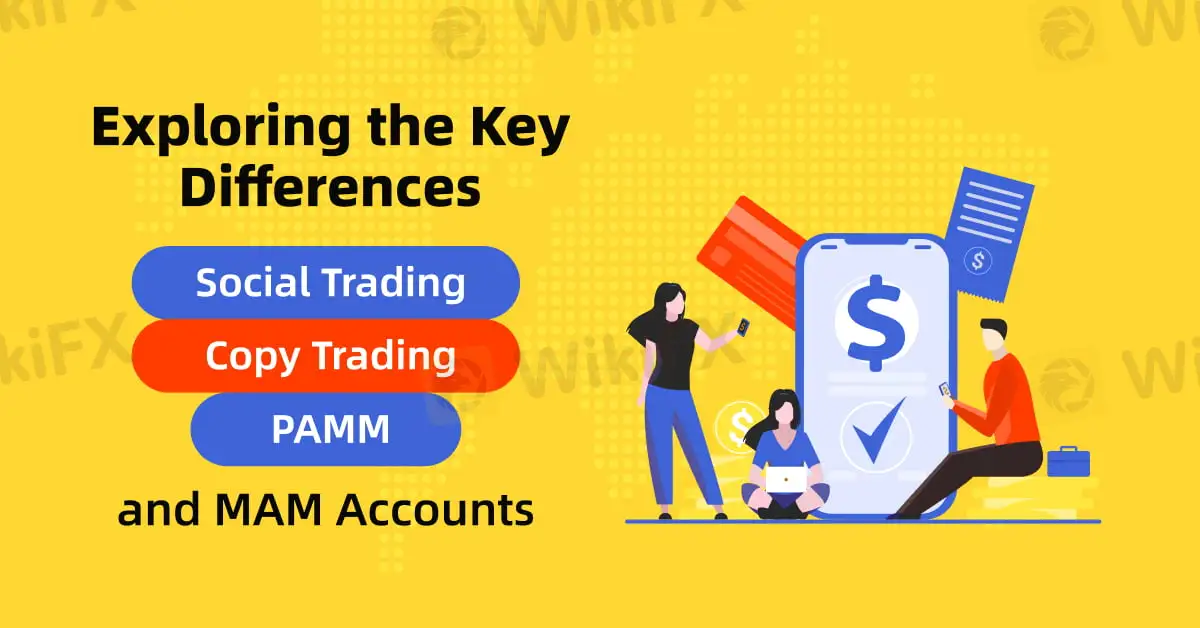Exploring the Key Differences: Social Trading, Copy Trading, PAMM, and MAM Accounts
Abstract:In the world of online trading, various account types and trading models allow investors to participate in the market with varying levels of involvement. Among the most popular are social trading, copy trading, PAMM (Percentage Allocation Management Module), and MAM (Multi-Account Manager) accounts.

In the world of online trading, various account types and trading models allow investors to participate in the market with varying levels of involvement. Among the most popular are social trading, copy trading, PAMM (Percentage Allocation Management Module), and MAM (Multi-Account Manager) accounts. While each of these methods has its own advantages, understanding their differences is crucial for selecting the one that best aligns with an investor's goals and risk tolerance.

Social trading is a relatively new concept that allows traders to observe the strategies and trading behaviours of others within a community. Platforms that offer social trading often feature live feeds where users can view, comment on, and discuss trades made by others. This model promotes transparency, enabling traders to learn from others by following more experienced investors. While its a great tool for beginners to learn, social trading is not necessarily automated. Participants still need to manually replicate trades they like unless the platform also incorporates copy trading functionality. The focus here is on fostering a community-driven environment where information and strategies are shared.

Copy trading takes the concept of social trading one step further by automating the process. Instead of manually placing trades based on observations, investors can directly copy the trades of experienced traders. The investors account mirrors the trades of the selected trader in real time, automatically replicating the trades at the same proportion. This model appeals to individuals who prefer a hands-off approach, as it requires minimal involvement once set up. However, risks are inherent in copy trading as the investor is completely reliant on the chosen trader's decisions. Platforms offering copy trading usually allow investors to choose traders based on risk profiles, past performance, and strategies.

PAMM accounts function similarly to managed funds. In this model, investors allocate their funds to a professional trader or money manager, who then manages these pooled investments. The distinguishing feature of PAMM is that the manager‘s own capital is also part of the fund, aligning the manager’s interest with the investors. Profits and losses are distributed among investors based on their percentage of the total pool. Unlike copy trading, PAMM account investors do not choose specific trades to follow; instead, they trust the manager to make all decisions on their behalf. PAMM accounts offer an efficient way to outsource trading but require trust in the managers expertise.

MAM accounts are an extension of PAMM, offering more flexibility to both managers and investors. In a MAM account, the manager has the ability to allocate trades in different proportions to various client accounts, allowing for a more customized trading approach. For instance, clients with higher risk tolerance can take on more exposure to certain trades than those with a conservative profile. MAM accounts are ideal for professional traders managing multiple clients with differing needs. The added flexibility of MAM accounts makes them popular among hedge funds and institutional traders.
In summary, choosing between social trading, copy trading, PAMM, and MAM accounts depends on an investors objectives and risk appetite. Each method has its own merits, and understanding these differences can help investors make informed decisions when navigating the financial markets.

Read more

Top 10 Trading Indicators Every Forex Trader Should Know
Master the top 10 Forex trading indicators to analyze real-time Forex quotes, trends, and market signals. Learn strategies to boost accuracy and avoid mistakes.

Why Do You Feel Scared During Trade Execution?
Trade execution is a pivotal moment for traders. It is when analysis turns into action, and potential profits or losses become reality. However, for many traders, this moment is accompanied by fear. Why does this happen, and how can you address it?

WikiEXPO Global Expert Interview: Simone Martin—— Exploring Financial Regulation Change
In the midst of financial innovation and regulation, WikiGlobal, the organizer of WikiEXPO, stays abreast of industry trends and conducts a series of insightful and distinctive interviews on pivotal topics. We are delighted to have the privilege of inviting Simone Martin for an in-depth conversation this time.

CySEC Settles Compliance Case with Fxview Operator Charlgate Ltd
Discover how CySEC resolved compliance issues with Charlgate Ltd, the operator of Fxview, through a €50,000 settlement. Explore the investigation, regulatory measures, and CySEC's new website designed for improved accessibility and transparency.
WikiFX Broker
Latest News
Volkswagen agrees deal to avoid Germany plant closures
Geopolitical Events: What They Are & Their Impact?
Top 10 Trading Indicators Every Forex Trader Should Know
TradingView Launches Liquidity Analysis Tool DEX Screener
MultiBank Group Wins Big at Traders Fair Hong Kong 2024
WikiEXPO Global Expert Interview: Simone Martin—— Exploring Financial Regulation Change
'Young investors make investment decisions impulsively to keep up with current trends' FCA Reveals
Why Do You Feel Scared During Trade Execution?
CySEC Settles Compliance Case with Fxview Operator Charlgate Ltd
Malaysian Influencer Detained in Taiwan Over Alleged Role in Fraud Scheme
Rate Calc
